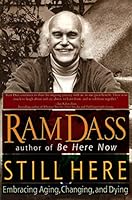
Still Here

We suffer because of a desire, an attachment, a clinging, so our suffering points the way to where the work is. With suffering, there’s suddenly a lot of motivation to rid yourself of the desire, and not much motivation to hang on to it—and the more desires I let go of, the freer I become.
Ram Dass • Still Here
Like all the experiences of an incarnation, pain has to be experienced fully by the Ego in order to be an effective learning experience for the Soul, but plunging in like that locks you into the pain. The only solution is to be on two planes at once: you have to enter the pain fully, and yet be in the Soul level at the same time. That’s fierce! You
... See moreRam Dass • Still Here
Gandhi says that before you can get to God, you’ve got to confront your fears.
Ram Dass • Still Here
They are trained to deal with the dying person’s thirst, coldness, heaviness, and breathlessness, encouraging the one who is dying not to cling to these phenomena. They offer such instructions as these: “As the earth element leaves, your body will feel heavy. As the water element leaves, you will feel dryness. As the fire element leaves, you may fe
... See moreRam Dass • Still Here
“Birth is thus. Death is thus. Verse or no verse, what’s the fuss?” He died only moments later.
Ram Dass • Still Here
Rilke put this beautifully when he wrote “That one can contain death, the whole of death . . . can hold it in one’s heart gentle, and not refuse to go on living, is inexpressible.”
Ram Dass • Still Here
We live in illusion, the appearance of things. But there is a reality. We are that reality. When you understand this you see that you are nothing, and being nothing, you are everything. That is all.
Ram Dass • Still Here
The most important thing is not to dread the future, and to stay open to whatever comes. No matter how strange or new it might be, I just try to tell myself: this is the stuff you’re working with now.”
Ram Dass • Still Here
Most of our fears, if we look at them clearly, relate to how we imagine the future will be. Fear thrives on the unknown, and although many of us avoid what scares us, it is more effective to approach our fears as closely as possible—to bring our ideas of the future into the present—in order to disarm them.